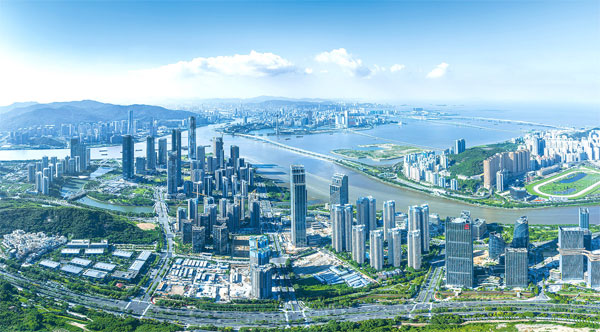Hengqin, Macao honing model of collaborative development
New university campus exemplifies spirit of cooperation

A view of the Guangdong-Macao In-Depth Cooperation Zone in Hengqin. [Photo provided to China Daily]
Construction of a new campus of the University of Macau is underway in the Guangdong-Macao In-Depth Cooperation Zone in Hengqin. Covering approximately 375,600 square meters, it is expected to open in 2028, accommodating faculties such as medicine, information technology, design and engineering.
The new campus will also house institutes for interdisciplinary and advanced research, as well as the UM's Hengqin center for higher education, in cooperation with industry, academia and research.
Speaking at the Dec 9 groundbreaking ceremony, Ho Iat-seng, chief executive of the Macao Special Administrative Region, said the new campus "signifies a new milestone in the collaborative development and deep cooperation between Macao and Hengqin, and will further promote Macao's faster integration into the national development framework".
Construction of UM's new campus in the Hengqin cooperation zone is spurred by its vision to promote the high-quality development, as well as helping it achieve the strategic alignment of its "four new" sectors: sci-tech research and high-end manufacturing; traditional Chinese medicine; cultural tourism, convention and exhibition; and modern finance.
Hengqin and Macao are close neighbors. In September 2021, the central government issued a general plan for building a Guangdong-Macao in-depth cooperation zone in Hengqin, leading to the establishment of an administration staffed by both mainland and Macao officials at all levels.
Over the past three years, Hengqin has endeavored to aid in Macao's moderately diversified industrial development while constructing a livable and workable space for its residents. To this end, the integration of Hengqin and Macao is setting the course for a new era of close collaboration between the two regions.
In terms of industrial planning, Hengqin's "four new" sectors blend with Macao's "1+4" industry diversification strategy, which involves promoting the growth of one key sector — tourism and leisure — alongside the advancement of the big health, modern finance and high-tech industries, as well as conventions, exhibitions, culture and sports.
According to official data, as of the end of October, there were 6,521 Macao-funded businesses in the cooperation zone. In the first three quarters of this year, the added value of Macao-funded industries reached 2.63 billion yuan ($360.32 million), representing a year-on-year increase of 111.2 percent. As of the end of November, the number of "four new" industry enterprises had grown to 31,506, up 6.3 percent from the end of 2021. As well, in the first three quarters, the added value of "four new" industries reached 21.6 billion yuan, accounting for 57.8 percent of the cooperation zone's GDP.
In addition, Macao's economic diversification efforts have yielded notable results. In 2023, the added value of key sectors such as TCM and modern financial services surged to 39.05 billion Macao patacas, marking a 6.9 percent increase from 2019. Meanwhile, the gaming industry's contribution to the local GDP saw a significant 14-percentage-point decline compared to 2019.
Hengqin has been steadfast in its commitment to establishing a destination that enhances the quality of life and employment opportunities for Macao residents. In a groundbreaking collaboration between the governments of Guangdong and Macao, the Macau New Neighborhood project was officially introduced in 2023 to satisfy the needs of Macao residents — many of whom have since relocated to Hengqin, benefiting from essential amenities such as Macao-centric schools, community services, and household assistance. As a result, the cooperation zone is progressively evolving into a distinctive enclave, embodying the essence of a fresh beginning for Macao residents.
On March 1, the cooperation zone announced implementation of a policy of "opening up the first line and controlling the second line" under the close-loop customs arrangements, marking a pivotal stride toward an integrated and open framework in sync with Macao. The boundary between Hengqin and Macao was designated as the "first line", while the boundary between Hengqin and other parts of the mainland was designated the "second line".
"This move directly benefits the advancement of technology R&D, TCM and other Macao-branded industries, as well as advanced manufacturing companies in the cooperation zone," said a business operator, noting that the concerted efforts of a series of policies are expected to drive Hengqin and Macao to accelerate formation of a complete industry chain system and cultivate more productive forces.
Since the implementation of the management policy, the daily average inbound and outbound person times at the "first line" port stands at around 62,000, with approximately 6,700 vehicle trips, while the daily average number of vehicle trips leaving the island through the various channels of the "second line" is about 53,000. The number of inbound and outbound passengers passing through Hengqin Port has exceeded 20 million since the start of 2024, setting a new record. In addition, the Macao light rail Hengqin line opened on Dec 2, further enhancing cross-boundary travel for residents.
"It is more convenient to conduct business and entrepreneurship between Hengqin and Macao," said Leong Ka-seng, a Macao entrepreneur who has operated tea restaurants in Hengqin for nearly 10 years.
"The integration of regulations and systems between Hengqin and Macao is constantly deepening, and Hengqin is a vibrant and energetic place for doing business," he said.



 Print
Print Mail
Mail

